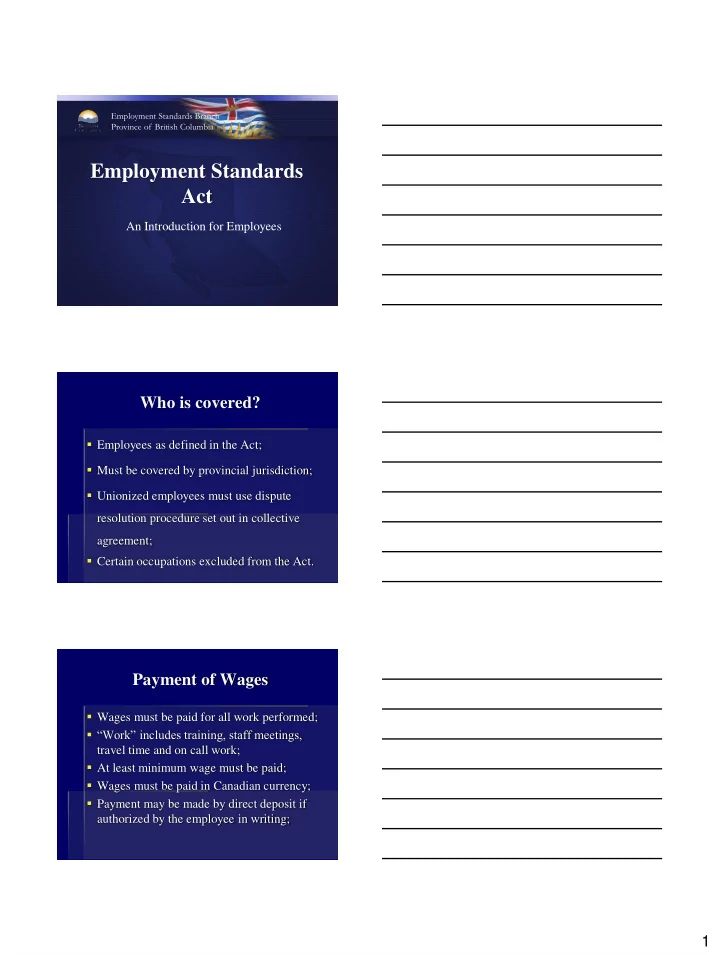

Employment Standards Branch Province of British Columbia Employment Standards Act An Introduction for Employees Who is covered? Employees as defined in the Act; Must be covered by provincial jurisdiction; Unionized employees must use dispute resolution procedure set out in collective agreement; Certain occupations excluded from the Act. Payment of Wages Wages must be paid for all work performed; “Work” includes training, staff meetings, travel time and on call work; At least minimum wage must be paid; Wages must be paid in Canadian currency; Payment may be made by direct deposit if authorized by the employee in writing; 1
Payment of Wages (cont’d) There must be at least two pay periods every month; Wages must be paid within eight days after the end of the pay period; If an employee is fired, final wages must be paid within 48 hours; If an employee quits, final wages must be paid within 6 days. Wage Statements Written wage statements must include: Employer’s name and address; Employee’s wage rate and hours worked; Overtime wage rate and number of overtime hours worked; Any money, allowance or other payment the employee is entitled to, i.e. vacation pay, statutory holiday pay, bonuses, etc.; Wage Statements (cont’d) If the employee is paid other than by the hour or by salary, how the wages were calculated; Amount and purpose of each deduction; Employee’s gross and net wages; How much money the employee has taken from his or her time bank and how much remains. 2
Minimum Wage $10.85 an hour - Regular Minimum Wage Commissions, salaries and piece rates must be equivalent to minimum wage. $9.60 an hour - Liquor Server Minimum Wage Primary duties to serve food or drink; Serves liquor directly to customers as regular part of duties. Other minimums for resident caretakers, live-in home support workers, live-in camp leaders, and farm workers paid by piece rate. At a new job… Keep a record of daily hours, copies of pays stubs and personal correspondence with employer; Understand employment-related rights and responsibilities including Human Rights, Employment Standards, EI, WorkSafe BC and income tax; Raise questions or concerns with your employer; Employer is entitled to expect that you: arrive on time, be productive, avoid unexplained absences, dress and act appropriately, follow the rules, avoid conflicts of interest and return company property. Dispute Resolution Process Self-Help Kit; Filing a complaint; Mediation; Adjudication; Investigation; Determination; Appeals. 3
Self-Help Kit The Self-Help Kit helps an employee to: Decide whether the Employment Standards Act applies; Assess whether an employer is contravening the Act; Calculate how much money is owed; and Make a written request to the employer to pay money owing. If the employer agrees with the employee's request, money can be paid directly to the employee to resolve the matter. Self-Help Kit not required Employer’s business is closed; The matter involves a person under the age of 19; The employee is a farm worker, garment or textile worker, or a domestic; The employee has significant language difficulties; The complaint is related to a leave provision of the Act; The employee has already sent a letter to the employer attempting to resolve the issue. Filing a Complaint Complaint Must be in writing and delivered to an office of the Employment Standards Branch; May be submitted online, mailed, faxed or delivered in person; Must be delivered within six months of last day of work or, if still employed, within six months of contravention. Wage recovery Wages can be recovered from the last six months of employment or, if still working, from six months before the complaint was filed. 4
Mediation Officer of the Branch conducts informal meeting between employer and employee; Takes place in person or by teleconference; If parties resolve dispute, officer drafts settlement agreement and file is closed; If agreement is not honoured it can be filed in court for collection; If dispute not resolved, proceeds to adjudication. Adjudication If a complaint is not resolved at mediation, adjudication hearing is scheduled; Hearing may be held in person or by teleconference; Parties may give evidence, call witnesses and question the other party; Officer will issue written decision, which will include mandatory penalties if wages are found to be owing. Investigation Some matters may be resolved by way of investigation; Officer will try to resolve the matter informally; If not possible, will issue written decision. 5
Determination If a matter cannot be resolved voluntarily, a written decision will be issued; Called a “determination”; If a determination finds an employer is not in compliance with the Act, it will contain mandatory penalties. Appeals A party to a determination may appeal the determination to the Employment Standards Tribunal; EST is separate from the Employment Standards Branch; Appeal information is contained in the determination. How to Contact the Branch Web site: www.labour.gov.bc.ca/esb General information, policy interpretation, forms, factsheets, contact information Toll Free Info-line: 1-800-663-3316 General inquiries Branch offices (10 locations) 6
Recommend
More recommend